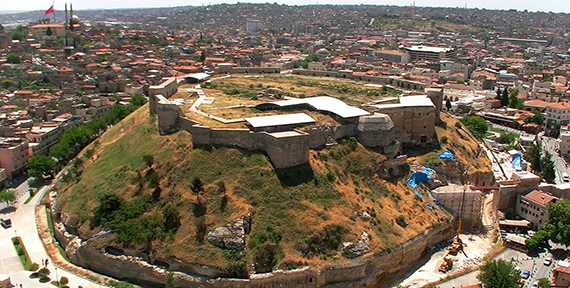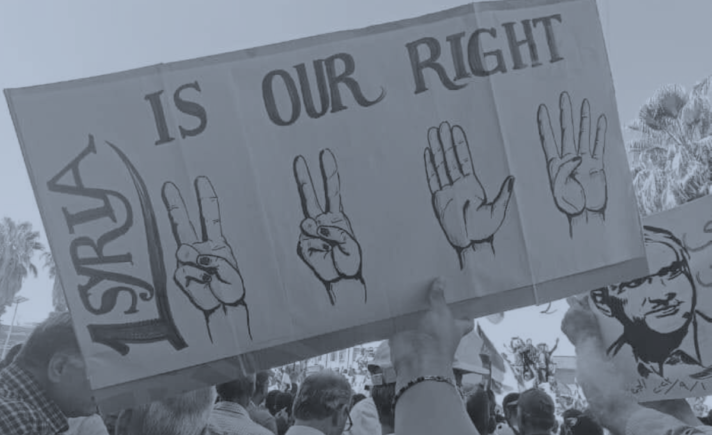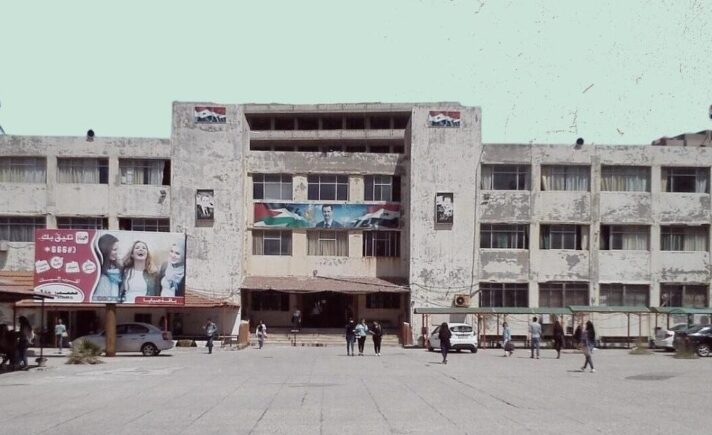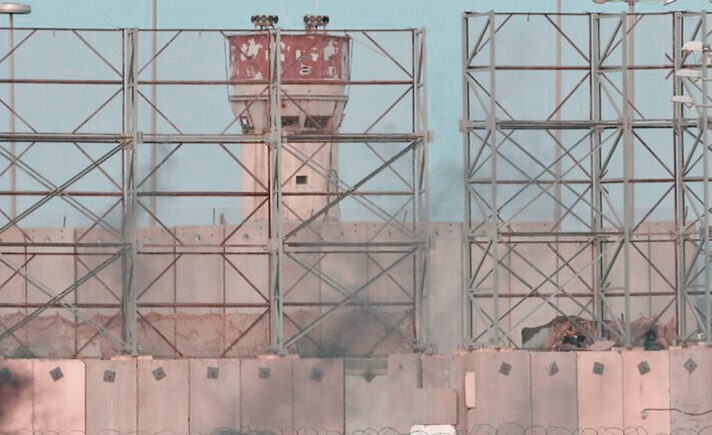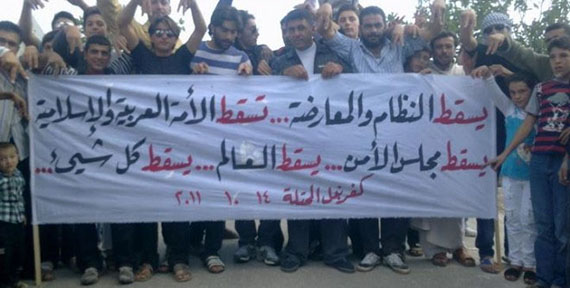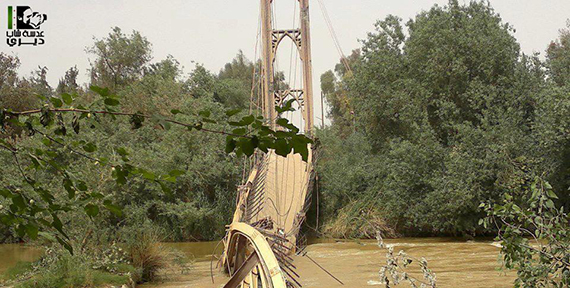Few are the Syrians who express a definitive opinion regarding the Turkish city of Gaziantep. It is a “problematic” city for most: some romantics describe it as the cold city; whereas others, who resent it and reside in other Turkish cities, would label it “the headquarter of the elitist clique,” or reduce it to “the activists,” which resembles a polite ostracization; the third party, who are the most pragmatic and neutral, describe it impartially as “expensive,” indicating the high cost of living compared to other Turkish border cities.
From my perspective, the city of Gaziantep seems to be the closest to us, and the furthest from us at the same time, in a more peculiar manner than we see in other cities. Given its castle, which looks like a miniature version of the Aleppo Citadel, its proximity to the Syrian border, and its weather, which is also similar to several regions in Syria, Gaziantep is very near. But it is also distant, because it is an exile – a negation of the homeland. It is the exile in the proximity, the closest exile to us, which makes it an exile that tastes like home, or a temporary home in exile. It’s more than a mere transient city, but falls short of being a permanent destination.
In any case, I will not touch upon the patterns and categorizations of Syrians according to their attitudes towards Gaziantep, mainly for two reasons. First, because I generally detest absolute stereotypes in assessing matters, so I will attempt to break the stereotyping which often envelopes any judgment on the “activist town”. The second reason is that there are tales and lives of other human beings, including my own, that also deserve being approached, instead of the unjust judgement that limits Gaziantep and the lives of its Syrian residents to one of its less seemly manifestations and experiences.
I recall here an introductory session about the work of a considerable civil society organization in Gaziantep, in which I was surprised by the disdaining and supercilious tone of a civil activist: “It is unreasonable that you implement projects in Antakya, Mersin and Urfa, and not here in Gaziantep… Here is the center of the activity of Syrians, here is the capital of Syrians!”
But what is so different about Gaziantep –the so-called capital of Syrians– that it should receive, alongside its refugee population, a special treatment of sorts? Why do a considerable number of Syrians living in Turkey stress the uniqueness of Gaziantep as a city of refuge? Gaziantep is just another Turkish border city close to Syria, home to hundreds of thousands of refugees, just like several other Turkish cities. What may be different is the heavy Aleppan presence, especially merchants and traders, and of course some real estate brokers (dallālīn). These are a particular class condemned by many Syrians here for their exploitation and lack of conscience, accusing them of being responsible for the existence of what is called “commission” – sums charged by these men for their real estate services. Their adversaries say that this did not exist in Gaziantep before, and that these are the ones who established this tradition in the city.
In this city lies also the main headquarters of the Syrian interim government, in addition to the headquarters of most Syrian NGOs. Despite all that, the enthusiasm which a man in his twenties has for this “capital” city and its refugees does not seem justified, nor fair to Syrians in Turkey.
No to Learning Turkish, No to Permanent Expatriation
Two days ago, I noticed that the Turkish janitor in our building –which has substantial security measures– was no longer there. My neighbor, an old lady, told me that the man had suffered a cardiac attack, and is in a critical condition, so they decided to discharge him from his job.
Only two weeks prior, I was on my way home, when I was stopped by the janitor. He asked, in Turkish of course, if I am able to read English. I told him that I might be able to translate from English, but into Arabic and not into Turkish, so he will not benefit in any case. My conversation with him was a series of gestures and Arabic words, connected by a thin thread of Turkish words here and there. I read what is written on the back of the pill bottle, which included a warning of its use by patients with heart disease. During the subsequent ten minutes, I strived to communicate this warning, and when I understood that I have succeeded, I left and continued along my way.
Ever since I heard the news of his affliction, I have been contemplating how we exert energy and effort to learn all languages except Turkish. Why this insistence on not learning it? My faith in a return to Syria is shaken further with each passing day here. Everyday return becomes farther beyond grasp. Perhaps I could have saved the life of the aged Turkish janitor if I had learned Turkish. What if a similar incident were to occur in the future? What if the next person were to be a relative or a friend, or if my own life depended on knowing a few words in Turkish? The only ready solution is to deal exclusively with Syrian vendors, and to live in buildings with Syrian janitors. The solution can be to find shelter in each other, to observe the other from afar, and to settle for “Günaydın,” “ne kadar” and “bilmiyorum” [Good morning; how much; I don’t know] and their likes – words that spare us a variety of sentences and necessities we cannot communicate in Turkish.
I often feel concerned that I may conduct myself similarly if circumstances allowed me to travel to another country. Will I be finding excuses for not learning its language, be it English, French or any other? Or will I learn it? Perhaps learning and not learning are equally unfavorable. If I learn, I will forget my country and my family, and perhaps all what I used to be; and if I did not learn, I will be just another expatriate pained by nostalgia.
Strangers are Relatives
As for the Syrian janitor that I met while living in the previous building, the one before I moved to this one, we still maintain rapport via social networking applications, and exchange greetings on holidays and special occasions. He wishes me happy years and checks up on me on a regular basis. Nasser is a nice man from Saraqib. He used to call me “Sir” whenever we meet. I told him several times that he ought to do away with formalities, but his utter gentleness prevents him every time from being casual.
He once showed me his own writings on a few papers: stories about the revolution, and about a young martyr who was shot in a demonstration one day prior to his wedding. It seems from the writing that Nasser’s grief is tremendous. I could not help him publish what he wrote, but I emphasized the necessity of keeping them even if they do not get published. They may constitute a beautiful and legendary story about this generation, to be read by a son or a grandson, who may in turn feel proud and thrilled by the characteristics of a martyred friend of their father’s or grandfather’s. “How expensive legends are,” I concluded.
This is what was of concern to Nasser. As for the concern of my formidable old Aleppan neighbor lady, it was returning to Aleppo. Two days ago, right after I met her in a nearby park, she told me: “Everyone is returning home! Our Iraqi neighbors, do you know them? They left their homes yesterday, and they said they’re returning to Iraq. Everyone is too bored here, except for us… we’re yet to be.”
I try to comfort her by saying that Iraqis are not better off, and that they are returning to Kurdistan and not to their towns and homes: “Everyone is the same.” Yet her grief persists in her hollow eyes. She and her elderly husband used to look at me with a bit of suspicion, just like any family man or woman encountering a person coming home alone, without a family, without a wife and children. Perhaps they secretly pity me for the life I am leading. When we first talked, she passionately told me: “I’m like your mother, darling. Let me know if you need anything at all.”
Her elderly husband speaks with me about the three homes he once owned before they were destroyed by the war. How difficult it is for him to rent a residence today after having been an owner of his houses. Abu Mahmoud tries to kill his time in exile by working in the small garden oustide his house, plowing the soil, watering the flowers and trimming them. I wished several times to take part in that, for I, the young twenty-four-year-old guy, am just like him, in desperate need for killing the time of this prolonged exile and burying it under some soil. But I did not want to intrude into his pleasurable solitude in his garden.
My neighbor Abu Mahmoud moved out, renting a house closer to his sons. In our last encounter, he told me that he is Kurdish but pretends to be a Turkman: “We have to be resourceful, son! What else can we do?” He also told me how he conned the Turkish border guards into believing that he is a Turkish citizen and letting him cross the border. He took advantage of his good Turkish, which he learnt from his Turkish step-grandmother who raised him.
He told me about his village in the vicinity of Afrin and about his reminiscences of it. When he was a child in the wake of World War II, he said, Indian soldiers arrived to his village along with British and Free French forces. He vividly remembers the cremation of a dead soldier in Afrin River according the funeral rites in Hinduism. He also revealed to me why he gave up his past forensic medical career: he had to autopsy the bodies of two young men from his village murdered in a fight over a petty piece of land. He then realized that this career offends his humanity and that of whoever dissects and cuts up corpses with a scalpel, despite the financial returns it used to yield, and which he really needed. He looked at me and said: “Times have changed, son… humans are being murdered in the thousands, and others are walking thousands of kilometers away from their land.” He spoke at length during our last encounter, almost summarizing his entire lifetime, his eighty-one years.
The conversations Syrians have in Gaziantep are numerous. They talk about their regions, their families and kin, emigration to Europe, and how Turks use vegetable oil instead of animal fat, to which they attribute the smell of their bodies that they claim is different from the smell of theirs. They often conclude these conversations in exalted triumph, stating things like “Syrians are more discerning,” and “There’s nothing interesting in Turkey.” Meanwhile, they continue to avoid their classic topics of conversations, which are the daily bombardment and carnage happening in a faraway place. This place is somewhere they left behind, and rarely did they feel at ease ever since.


